#religion in ancient Macedonia
Text
Mermaids Tale - Chapter 4

This was a fun chapter to revise, no smut, just pure details of Heeseung's ancestry. hehehehe. it's getting good.
So because tumblr is still being a pain, this isnt' really proof read. I couldn't copy and paste the chapter in, so i had just retype the whole thing while staring at the original draft to keep the flow of the storyline accurate, but there might be some grammar errors. I'll fix that whenever Tumblr stops being mean to me.
Pairings: Heeseung and you
Warnings: So while there is no smut, there is mentioning and implying of slave breeding, coerce sex, rape (not mentioned directly, just implied) being used for DNA, capture and imprisonment, and i think that's it. some of it is directly stated, while majority of it is heavily implied.
Begin read below line :)
8th Century BC
In the northern sphere of the southwestern district, an area where the Balkan Peninsula would eventually run through in the Mediterranean region, an ancient kingdom currently occupies a large part of the European continent, bearing as the most notorious empire in the world.
Named after its line of successors during the age of its victorious period, the kingdom had become the most significant empire during the Byzantine Dynasty. It’s last known ruler, history’s triumphant conqueror, Alexander III of Macedon, son of Philip II, became greatly known for his enhanced strategic command and leadership, and the greatest King during the Macedon Dynasty.
Today, he is commonly known as Alexander the Great.
Following the events that took place within the Asia Minor, the great king feared of the dangers that lurked and threatened his line of succession. Establishing a hidden order and made up entirely of his secret sons to carry out his legacy, a clan, called the “Sons of Adam”, named after the First Man, was created. Carrying the bloodline of his ruling essence, through ages of descendants produced by his own offspring, Alexanders will, unaware by the myriad of enemies he made during his conquer, thrived through the proposed non-existence of his male heirs.
Knowing the dangers of corruption that remained prevalent in his kingdom, Alexander could not afford to put his bloodline at risk of elimination at the hands of his enemies, thus all records of his sons were destroyed, as they were removed from the kingdom and tucked away within the great monasteries of the continent.
By forming the clan, members, simply known as an “Adam”, were highly trained and skilled in the art of using sword and shield. They learned the battle techniques that were both domestic and foreign to them, developing advanced flexibility, stamina, and strength. Under secrecy, they were assigned to the temples that worshipped the ancient Gods of their time, serving as the guardians that protected the old religion, becoming just as forgettable as the priests and nuns who lived amongst, and cared for them.
When Alexanders untimely death came about, many throughout Persia and the Asia Minor displayed their corruptions as countless formations that the former king left behind, were eradicated. Many agreements became broken, all leading to the division of the Macedon Kingdom, ceasing its existence.
To avoid the risk of exposing their identities, the Sons of Adam were eventually migrated to Hellenistic Sicily, to further keep their lineage a secret as the last known warriors of Macedonia.
Through the natural and manmade disasters that occurred through every period of the world’s age, the sons of Alexander the Great had no choice but to spread, furthering the promotion of their procreation as the prestige lineage of a dying breed.
In the early 19th century, a young Merchant Marine by the name of Ethan Alexandros, travels and participates in the Russo-Japanese War during the Joseon Dynasty. In the aftermath, Ethan retires and remained in the conquered country of Korea, marrying a local woman, and carrying out his deed as a descendant of his great relative and wife, Alexander and Roxana, as well as carrying out the sworn duty as an Adam.
Much like his relatives, the fellow Adams immigrated throughout the world, spreading their legacy, and secretly merged with humanity. Through their great traits, some of which displayed longevity in their lifespan and youth, or inhuman strength, the Adams were careful to remain unidentified, Ethan was no different.
Continuing the bestowal of his ancestor’s birthright in the oriental region, Ethan and his wife produced three sons, all of which continued the lineage of male born offspring to continue. Just as his relatives had done to him, he blesses them with a surname that is not of his own, to carefully maintain the discretion of the clan’s formation. Allowing his children to inherit the name of their mother’s family, Ethan’s sons were all christened with the surname, Lee.
Today, a young man, unaware of his superior lineage, migrates through the city. With the intelligence equivalent to that of the most respected educators in the world, and the abnormally high aptitude of mastering abilities, both in combat and various skillsets, Lee Heeseung is bidding farewell to his peers and employment, as a member of the elite SWAT force of the Provisional Government in his division. Along with his elder brothers, the boys displayed impressive records of their abilities in their military background, earning them an expedited transfer into the force upon completing their time in service, as the eldest became the lead security chief of staff for the nation’s government, while the middle brother was contracted as a general for the nation’s largest military force. The youngest, with his high modest and humble value, opted for a contract to better serve the public, and signed with the police organization, accepting the role of supervising team leader and chief of his division.
For the youngest son, that was always the case, he differed greatly from his elder brothers. He was smarter, stronger, the highest skilled and talented among the three. It was widely known how abnormally attractive each brother was, however, Heeseung always won the majority of popular votes when it came to being the best looking out of the three. It wasn’t just limited to his appearance either, the man had a gift of song as he would often, while unintentionally, serenade every woman, or even men, whenever his team would let off some steam and partake in a night of drinking and karaoke. Bewildered by the trait of capturing the hearts of everyone around him, it was eerie for his friends and co-workers to note how the people around him, as he sung sweetly to the tunes of the song of choice, entranced all around him.
How was this possible?...
‘The ancestor Ethan was a descendant of Alexander and his youngest wife, Roxana, well after the order was established, many Adam’s caught the eye of kings and rulers during the period of when mortals were at war with the Sirens. Noting their enhanced combat abilities and vast knowledge in foreign weaponry and techniques, the Adam’s were all bid and hired by the kings of the land to aid in humanity’s conquest in defeating the Sirens.
Just as expected of them, the Adam’s were able to not only fend off the maidens of the sea, somehow, though still unexplainable, the Adam’s were immune to the whims of the oceanic goddesses as many of them were defeated and brutally killed off by the prowess of the clan, though, had they not been masked and blinded by the steel guard of their head pieces, inhibiting the clear view of the other worldly beauty of each maiden slaughtered, the clan would have committed to more humane death.
After realizing the beauty of these maidens, which appeared to be the only factor that had any effect on the clan, the eldest Adam, Philippe, commanded his brethren to capture and detain whatever maiden was left. Upon learning that the maidens had the ability to develop legs, the captured Sirens were imprisoned on land, within the grand estates of the clan, all awarded by the kings that hired the young men.
Unbeknownst to the royal family, the Adam’s brought back the remaining Sirens, trapped them within their mansions as they turned them into wives, and produced future sons with them. It was both out of endearment and love for their beauty and to enhance their bloodline as they discovered that offspring between an Adam and a Siren, contained the capabilities of both worlds. Their lifespan increased, immunities against disease and poison was enhanced, their strengths and ability in the water also evolved. Though it wasn’t apparent with every single offspring, some, the rare types, were born with all the above traits, along with the ability to hypnotize their opponents with their voice, a trait that solely came from the lineage of their maternal side.
An uncommon ability, yet widely desired amongst the descendants, the Adam’s strived to produce the strongest of heirs, as they kept the Siren’s to themselves, forcing them to live and adapt to live among mortals, something that Celine, the youngest siren, did out of her own accord.
Aware of what had happened with her captured sisters, Celine was careful to avoid crossing paths with the male descendants. However, the dying number of sirens that managed to avoid getting captured, were all forced to hide in the deep trenches of the ocean, remaining out of sight as they feared the clan. Realizing that she did not desire to lurk in darkness forever, Celine migrated to the land, where she portrayed herself as a mere mortal survivor from shipwreck, met and married a kind sailor who became enamored by her beauty and sweet voice.
Within due time, Celine learned to love and care for her husband, wanting nothing more than to be by his side forever. Even though her tolerance for mortals was more temperamental and gentler compared to the ruthless behavior of her sisters, Celine never thought it possible to love one. Yet, as fate would have it, her immortality inhibited her from continuing her happiness with him in the afterlife, thus was left with no choice but to disappear and go back to the sea once her husband aged but noticed that his wife’s appearance remained the same. It was heart breaking; however, she knew it had to be done for the safety of herself and her daughters. Making a pact and telling them of their bloodline, the daughters bid farewell to their mother, and continued their lives, promising that the story of their ancestry is passed down to each generation, and if the moment comes where a daughter falls in love and marries a mortal, she too, at some point in her life, will have to disappear and live her life roaming in the sea…’
Earlier in the year, the elders of the Lee family established an agreement for the three brothers to take over the major corporation as the President, CEO and Executive Director of the affluential company that monopolized the world, establishing an impressive family background and insurmountable wealth to their name. It was always the family’s wish, contracting an agreement with the boys since childhood that they were free to choose their path up until the time would come, where each one must set aside whatever career or background they marked on their own, and take in the responsibility of continuing the direction of the family’s economical creation, to maintain the superior status of the Lee family line. It was an act to keep the business strictly within the family, avoiding the risks of outsiders in corrupting and ruining what the Lee family had created and entitled in their name.
Each day, adorning dashing suits and expensive accessories, Heeseung slowly acclimates to a lifestyle that lacked the thrill and adventure he was accustomed to by joining the Navy Seals, transferring into the SWAT force, and overseeing the division of the districts most promising officers.
Soon after he inherited his new billet of becoming the executive director of his family’s company, under the mentorship of his grandfather, the feeling of complacency coated his mood as he found himself succumbing to boredom. Taking note of his lack of enthusiasm, the senior member of the company’s presidential board did his best to enthrall his grandson in a myriad of ways; hiring the prettiest applicants to fulfill the roles of his personal secretary or filling the entire upper floor of the headquarters building with the loveliest staff members to accompany his business trips at his choosing.
Appreciating his grandfather’s efforts, Heeseung put up a front, but never exposed that his grandfather’s method didn’t work. It only provided temporary aid in relieving the mental frustrations he developed from his administrative duties as he chose one lovely woman or another each week, bedding and spoiling them rotten until they too became dull and boorish to his desire.
Day by day, Heeseung managed to acclimate to his new duties by balancing his time in the prestige gym facility at the company’s headquarters building, or by frequenting the luxury spots in town with a different beautiful woman by his side. The thrill of seeking, tracking, and capturing criminals or terrorists was hard to replace, but he somehow was able to manage. Long before he knew it, the yearning sense of that active career didn’t bug him as much, largely thanks to the amount of martial art sessions he did throughout the day, at least his senior position at the company allotted him his own schedule to do nearly whatever he wanted. It was good to be king. Within due time, he mastered the arts of Karate, Jiu Jitsu, Muay Thai, hell, he ever learned to dance extravagant choreographies, hiring the best in the business as tutors.
Getting by, he grew more content, putting his elder family members at peace of mind as they were overly concerned the boy would stray from his diligent duties, due to the austerity of adapting to his new environment. It all became a lot easier once he was able to fill his days with the most challenging and physical demanding hobbies, and developing friends whose families became connected to his family through contracted partnerships, expanding influence and wealth, yet remained just as humble as he did. Friends such as Jake, and Jay.
Yes, all was seemingly going well and finally he was beginning to feel content…
Until he met you…
Not only did the urge and the thrill of ‘hunting’ came back to his senses, but it was also stronger. Much stronger than it ever had been. Unsure as to why, it was clear that you weren’t a criminal or posed as a threat to anyone, if anything, you were dignified and classy, it was remarkable. Yet your physical traits, whistling voice, and royal posture went unnoticed as he couldn’t help but watched you the entire event that night. His mind was filled with all sorts of thoughts, some sordid, while others were genuinely romantic. It was hard to make sense of the feeling, he’s never felt it before, something just stirred inside him, and it was so powerful that he swore he stopped breathing for a moment.
Aside from being trapped in a world of your wonderous beauty, there was another matter that was left unexplained. In the parameters of your presence, there was a feeling, a sensation that ripped through his body, it was neither painful nor pleasant. Almost as if something about you was calling to him, it was a phenomenon that only could be felt whenever you were nearby, yet the moment he noticed and watched you sneak out, under the pretense that you did so undetected, he allowed you to ‘escape’ as his theory turned into a fact when he watched you exit out of the ballroom, and along with you, that odd sensation disappeared.
However, even after you departed, it did nothing to inhibit the image of your face, the swaying of your body and feminine essence as you walk, and the flowing of your hair, it all permanently remained in his mind. When he took Kourtney to his bed that night, fucking her was hard to focus on, which wasn’t an issue with all of the women he’s had in the past. Fact is, the dashing playboy became desired not just for his handsome looks and soothing voice, the rumors that spiraled from one woman to the next built his reputation of how talented he was in bed. By morning, each woman lucky enough to be plunged by the Asian Casanova became a pool of a submitted mess as they became dazed and begging for more, in which he gladly obliged, all thanks to his high stamina, yet after weeks, perhaps even months, he left a trail of broken hearts as he expressed his lack of enthusiasm with whatever beauty he had been courting at the time.
Somehow, there was something inside that gave a sense, that when it comes to you, things would be different. Much different. Almost as if his gut was telling him that you both were meant to be, that you were his soulmate, it was crazy, yet it only made sense to him as the voice in his head beading his mind, repeatedly chanting…
‘Take her.’
Writer's note: Chapter 5 is going to be posted really soon ;)
#heeseung smut#heeseung scenarios#heeseung x reader#heeseung hard thoughts#heeseung hard hours#enha x reader#enha heeseung#heeseung fanfic#yandere heeseung#yandere enhypen
59 notes
·
View notes
Text


Cyrus the Great with a Hemhem crown from Pasagardae 559-530 BCE.
"The four-winged guardian figure representing Cyrus the Great or a four-winged Cherub tutelary deity. Bas-relief found on a doorway pillar at Pasargadae on top of which was once inscribed in three languages the sentence "I am Cyrus the king, an Achaemenian." Scholars who doubt that the relief depicts Cyrus note that the same inscription is written on other palaces in the complex."
"Cyrus II of Persia (c. 600–530 BC; Old Persian: 𐎤𐎢𐎽𐎢𐏁 Kūruš), commonly known as Cyrus the Great and also called Cyrus the Elder by the Greeks, was the founder of the Achaemenid Empire, the first Persian empire. Under his rule, the empire embraced all of the previous civilized states of the ancient Near East, expanded vastly and eventually conquered most of Western Asia and much of Central Asia. Spanning from the Mediterranean Sea and Hellespont in the west to the Indus River in the east, the empire created by Cyrus was the largest the world had yet seen. At its maximum extent under his successors, the Achaemenid Empire stretched from parts of the Balkans (Eastern Bulgaria–Paeonia and Thrace–Macedonia) and Southeast Europe proper in the west to the Indus Valley in the east.
The reign of Cyrus lasted about thirty years; his empire took root with his conquest of the Median Empire followed by the Lydian Empire and eventually the Neo-Babylonian Empire. He also led an expedition into Central Asia, which resulted in major campaigns that were described as having brought "into subjection every nation without exception". Cyrus did not venture into Egypt, and was alleged to have died in battle while fighting the Massagetae, an ancient Eastern Iranian nomadic tribal confederation, along the Syr Darya in December 530 BC. However, Xenophon claimed that Cyrus did not die in battle and returned to the Achaemenid ceremonial capital of Persepolis again. He was succeeded by his son, Cambyses II, who managed to conquer Egypt, Nubia and Cyrenaica during his short rule.
Cyrus is well-known for having respected the customs and religions of the lands he conquered. He was important in developing the system of a central administration at Pasargadae governing satraps in the empire's border regions, which worked very effectively and profitably for both rulers and subjects. The Edict of Restoration, a proclamation attested by a cylinder seal in which Cyrus authorized and encouraged the return of the Israelites to the Land of Israel following his conquest of the Neo-Babylonian Empire, is described in the Bible and likewise left a lasting legacy on the Jewish religion due to his role in ending the Babylonian captivity and facilitating the Jewish return to Zion. According to Isaiah 45:1 of the Hebrew Bible, God anointed Cyrus for this task, even referring to him as a Messiah (lit. 'anointed one'); Cyrus is the only non-Jewish figure in the Bible to be revered in this capacity."
-taken from wikipedia
#persian history#cyrus#persia#iranian#antiquity#antiquities#statue#sculpture#art#history#ancient history#pagan#paganism
79 notes
·
View notes
Note
Out of curiosity, were there any facts (inasmuch as we can have in history) about atg/h that you were surprised to learn? Ones that are now in your view of them but when you learned them you thought them ooc or unrealistic
Sorry if this question doesn't make much sense, it's very late at night haha!
After studying them so long (over 30 years now), it can be hard for me to remember reactions, but two things do stick out:
When I realized Hephaistion wasn’t ethnically Macedonian.
While this is now pretty well-accepted, when I first stumbled over the name issue, back around 1995/96, working on my dissertation, nobody had assumed him anything other than a Macedonian. My discovery to the contrary was pure chance. The only place his origin town was given in our sources (Arrian) also happened to list Leonnatos as from Pella, but we know he was from Lynkestis. So I thought, “Oh, hey, I’ll go check and see if the names Hephaistion or Amyntor pop up on tombstones anywhere else in Macedonia.”
That was one BIG rabbit hole, let me tell you!
At the time, as a young scholar—even with oversight from two excellent senior ancient historians—I didn’t (in retrospect) do as thorough a job with the name search as I should have. I’ve remedied that since. My definitive work on Hephaistion’s ethnicity is now, “Becoming Macedonian: Name-mapping and Ethnic Identity. The case of Hephaistion,” with accompanying digital history mapping. But even back in the late ‘90s, my rudimentary onomastic (name) search was good enough to make my point so that it now appears in many/most entries on him. But it certainly wasn’t anything I expected to discover. An off-the-cuff question for my dissertation turned into a major rethinking about Hephaistion’s origins and helps us to better understand Macedonian naturalization.
The second surprise also concerns Hephaistion: that his military assignments were largely logistical and/or diplomatic.
When I set out to write my dissertation, my goal was to show that Hephaistion was more important than typically recognized in modern scholarship, so I collected every ancient reference to him, in all ancient sources. At the time, I did it on 3x5 cards. This research started in 1992, right after I got to Penn State. (Yes, I already knew what my dissertation would be on; I just had to convince Gene Borza that it was doable.)
Anyway, as I was playing with my cards, trying to sort them into broad types, I noticed some odd discrepancies. Now, first, be aware that statistics are a problem in ancient history because we have such SMALL samples. But looking at differences of 3-to-1, that got my attention.
That’s when I realized most of Hephaistion’s assignments were of a specific TYPE: logistical and/or diplomatic. Again, that’s now a generally accepted detail, but it wasn’t until I started making piles out of my 3x5 cards. Some of these conclusions were later published as “The Cult of Hephaistion,” with, yes, tables of these assignments.
This is a good place to make an important point for young scholars. Get in there and do the counting. Be comprehensive. Keep lists. Make 3x5 cards or sticky-notes. Record citations physically on large sheets of paper so you can visualize how it stacks up. In the day of digital, we lose track of just how much we can learn from SEEING in physical space.
Below are a couple pictures I took recently (2022), while recording Every. Single. Religious. Reference, in our 5 original sources. LOOK at it. Note the differences in patterns on the pages. That yielded a really interesting (to me) book chapter on how our sources talk about Philip and Alexander’s use of religion on campaign. This will come out in 2024 as part of a Companion book edited by Ed Anson. (Yes, there are tables!) I took the pictures to show Ed I was hard at work on it, as I was running a little late. But I’m glad I did take it, as it really illustrates how much one can deduce just from seeing.
I’ll be taking the same tactic as I move forward on my study of Hephaistion and Krateros’s careers. I’ll do for Krateros the same thing I did for Hephaistion (I still have those cards!). But I’ll also sort references by ancient author, to see patterns in how each represents the two men. I think it’s important to look at both, a horizontal examination of the type of reference, and a vertical look at trends within authors.
Yeah, I like my lists/tables. But I believe in being thorough. Impressions are suspect. Show me the numbers. (Even if I went into history to avoid math!)



#asks#Hephaistion#Hephaestion#Alexander the Great#surprises in research#Classics#Tagamemnon#be comprehensive in research#ancient Macedonia#ancient Greece#Macedonian military#ancient Macedonian ethnicity
44 notes
·
View notes
Photo

Athens After Empire: A History from Alexander the Great to the Emperor Hadrian
Ian Worthington’s Athens After Empire: A History from Alexander the Great to the Emperor Hadrian shows how there has been a tendency to fixate on the heyday of famous ancient cities while the events before or after have been unfairly and misleadingly eclipsed. Paul Cartledge’s excellent Hellenistic and Roman Sparta (1989) presents how such an approach distorted Sparta’s enduring importance. Now, Worthington's splendid, learned, and highly readable volume will achieve the same for Athens. Worthington's aim is to demonstrate that Athens did not fade away or drop off the historical radar or even decline into oblivion, and he successfully proves his thesis.
Scholars, students, and keen ancient history enthusiasts will all find this book a stimulating illumination of Athens beyond the Classical Age.
The book smoothly combines a chronological narrative with a thematic one, viewing the connection between the cultural context and development of the city against a historical backdrop of frequently turbulent events. Through this approach, Worthington shows just how culturally rich Athens was and how it remained so, even though the democracy of the 5th and early 4th centuries BCE never really returned. This, however, was not the only string to Athens’s bow. Chapters One, Two, Three, and Five deal with the fluctuating situation under Macedonia, with Chapter Four exploring how the changes of power and ruler affected democratic institutions. Chapter Six describes Athens’s brief enjoyment of independence following the death of Antigonus Gonatas. Chapters Seven to Eleven examine the effect of Roman domination on Athens and down to the Battle of Actium, while Chapter Nine is a thematic chapter on change and continuity in Athenian social life and religion. Chapters Twelve and Thirteen look at Athens under multiple Roman emperors until Hadrian. The final two chapters, Fourteen and Fifteen, have a more thematic focus, especially looking at how the city was physically changing under the emperors due to extensive building projects. Worthington employs several different types of evidence - including texts, inscriptions, coins, and architecture - with great skills to give a complete picture. Difficulties in dating specific events or people as well as the gaps in the primary sources are also lucidly addressed.
Continue reading...
22 notes
·
View notes
Text
Greek myths: POC in the Legends
It's typical to find some ethnocentric Hellenic pagans insistent on the general lack of colour in their religion. The stories take place across the Greek islands and Italy, so obviously there can only be white heroes and gods in the myths, right? Perhaps it's time for these folks to have a history lesson.

The vague boundaries of Ancient Greece stretched, at the very least, from Macedonia to Rhodes, and housed hundreds of states, towns, cities and villages. Many of these settlements were close to continents such as Africa, where the Egyptians and Carthaginians (a Punic nation) lived. Apart from them, the Greeks and Romans also knew of and traded with the "Ethiopians" (Αἰθίοπες), which was a general term referring to Black people (from Αἴθω + Ὤψ, "Dark Face"). This closeness of different ethnicities meant that there would be some diversity of religious figures by virtue of cultural exchange.
Memnon (Μέμνων) was the demigod son of Tithonus and the goddess Eos, and was the king of Ethiopia. There was also his brother Emathion (Ἠμαθίων) who fought Heracles. Eurybates (Εὐρυβάτης) was Odysseus' "dark-skinned" (μελανόχροος) companion, and was honoured by him above his other comrades (Odyssey 19, Lines 246-249).
And to use a more well-known example: Andromeda (Ἀνδρομέδα), wife of Perseus, was the daughter of Cepheus and Cassiopeia, king and queen of Ethiopia. The legendary woman more beautiful than Aphrodite was Black. She and Perseus may also be one of the earliest examples of an interracial union in the Greek stories.
And to those who would object and say these figures are represented as white in sculptures and wall paintings, the divergence from the original textual sources is a simple result of interpretatio graeca. People will often render foreign persons or deities through the appearance and mannerisms of their own nation (e.g. old paintings of Jesus in Ethiopia and China showing him to be Ethiopian or Chinese), and in this case Black characters were filtered through a Greek and Roman lens.
The ancient Greeks and Romans saw skin colour as a designation of one's national origin, but not as a racial identifier. If you approached a Roman and told him the vikings were of the same "race" as him, he would be deeply offended. "Race" was formulated by European pseudoscientists in the 15th to 16th centuries to justify the barbaric things that were done to enslaved Africans, Indigenous peoples in the Americas, and later South Asians.
I as a white person am wholly comfortable, and also appreciative, of the presence of people of colour in my religion. They serve as a reminder of the universality of attributes such as heroism, strength, kindness, courage and valour. Virtue is not bound to one skin colour, and we are all fundamentally one race: the Human Race.
So don't let these pseudadelphoi (false siblings) stir discord and disunity in our communities. All are welcome in the Faith and to the graces of the gods, regardless of colour, sexuality, or gender identity.
5 notes
·
View notes
Text
20 / 05 / 2022
🇬🇧🇺🇲 ENGLISH / ANGLAIS 🇬🇧🇺🇲
CHARACTER OF THE DAY #1 : ACHILLES
Today I would like to create a new series of publications that I would do on my blog, in order to renew myself and to speak, no longer of celebrities, but of fictitious characters embodied in cinema or on television. In the "CHARACTER OF THE DAY" series of posts, I will therefore be dealing with a male character embodied by a celebrity that I have already covered in a "MAN OF THE DAY" post or someone who is too famous for me to mention of him for a simple "MAN OF THE DAY".
To be simpler, I only have to speak directly about the first character. The first character I chose is ACHILLES, played by BRAD PITT in TROY. The film Troy (2004) at for attempt to tell as many events as possible of the Trojan War, one of the most famous episodes of the ancient Greek polytheistic religion that has been retained under the name of "Greek mythology". Achilles is therefore a mythical hero, son of a human king and a divinity, the Naiad Thetis. Of great strength, he is somewhat the equivalent of Herakles (Hercules in ancient Roman mythology). King of the Myrmidons, he is a respected leader, a brave warrior and a skilled fighter.
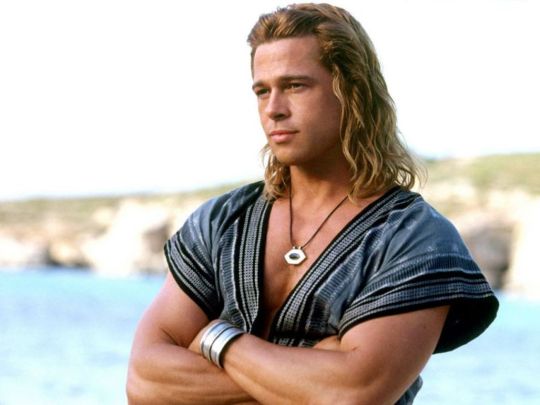
However, despite the fact that Achilles is very famous and has had very many adaptations in the arts (literature, theater, painting, sculpture, cinema, television, ...), the most memorable incarnation of the character is that of Brad Pitt in Troy (2004). The success and success of the interpretation of the character lies in the fact that this is how people imagine Achilles.
However, the film offers a vision of Achilles that is more American than that of the contemporaries of the myths. Indeed, in the myths, Achilles disguises himself as a woman to try to escape the war, but is recognized by Ulysses who sees him buying a sword (while Achilles is in his female disguise). Also, Achilles already has a son when the War begins, which is not the case in the film. Above all, the biggest difference is the fact that the relationship between Achilles and Patroclus is not a romantic relationship in the film. Patroclus is shown here as a young man who admires Achilles, he is protected by him.

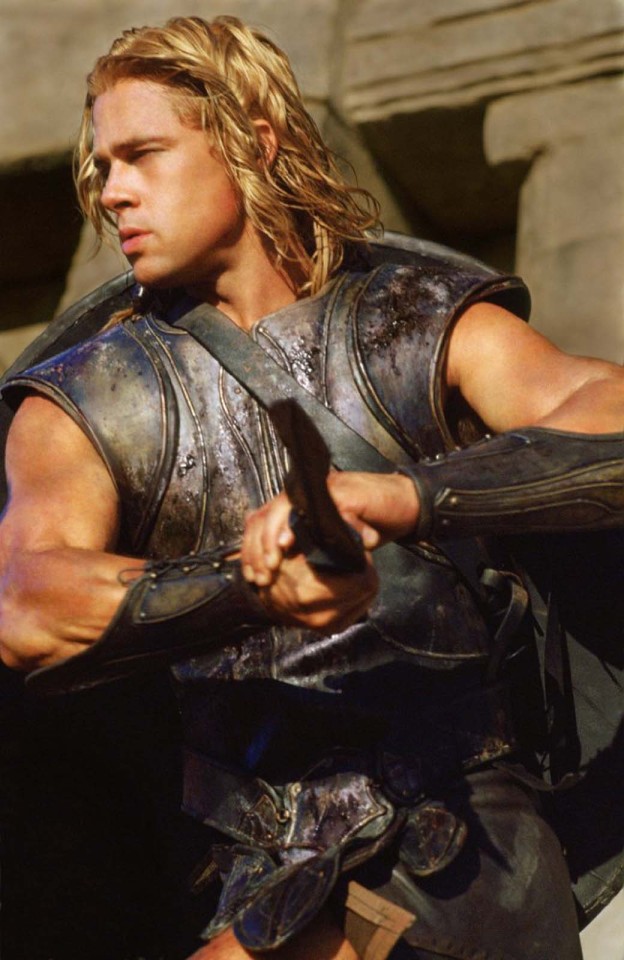
If it is difficult today to know if in mythology Achilles is the erast (which means the dominant man in the relationship between two men in Greek antiquity) or the eromen (the youngest, the one who is submissive), he and Patroclus were in any case a couple. As proof, King Alexander III of Macedonia, better known as "Alexander the Great", gathered at the tombs of Achilles and Patroclus in the company of Hephaistion, his lover (and incidentally my favorite male historical character 😊). You should know that, in Antiquity, sexuality was not as codified as it is now. Men and women do not consider themselves straight or gay or bi,... However, the interpretation of Achilles in Troy (2004) is very heteronormative.
If there are of course innuendoes on the possible homosexuality of Achilles or a romantic link with Patroclus, the film Troy shows above all a relationship between Achilles and Briseis, a Trojan princess (played by Rose Byrne in one of her first film roles) captured by King Agamemnon. Achilles will therefore recover the princess who has become a sexual slave and gradually fall in love with her. If the couple is beautiful (but forgettable, especially in comparison to Helene and Pâris or Andromache and Hector), Achilles is nonetheless shown as a seducer. Several scenes show him naked. And I come to the main point of this post.
What for me made the success of Achilles in the film Troy (there were even derivative products when the film was released, and since) is the beauty of actor Brad Pitt! Let's not hide it: Brad Pitt is one of the most handsome men in the world! A tall, muscular white male with soft blond hair, he seemed born for the role. Achilles is a brave warrior, but the film also gave him flaws, such as debauchery and arrogance (although he can afford it given his title as king, his divine origins, and his skill in battle). Nevertheless, I will forever be excited by the sight of Achilles' divine body because Brad Pitt does not hesitate to show off his sublime muscles.

The gif of Achilles shirtless and sweating is from the scene of his encounter with Princess Briseis, who has been installed captive in his tent. Well, even if the situation is delicate for Briseis who is a princess from the enemy camp, I am sure that many have dreamed of exchanging their places for hers. After all, who hasn't had a strong urge to wipe Achilles' divine body with his tongue, serve him and be his slave?! Many boys had to question their sexuality when watching this scene. Anyway, when we know that he was 41 years old at the time of the filming of the film, we can only admire the look and the charisma of the actor.
Of course Brad Pritt is handsome, but he is also self-confident, dominates the room with his presence (which, for Briseis as much as for the viewer, is both reassuring and intimidating), he is wise ( when he says that Briseis brought him peace during a time of war, it's really a sublime phrase from the film), and has a way of being obeyed by inferiors who are in his service. In short, Brad Pitt made an impression because he corresponds to the vision that the film wanted to give of Achille: that of a superior alpha straight white male.

If there is a fictional character (or an historical figure that appears in a historical movie or TV series), from a books, movie, TV series or whatever and you would like me to talk about, please feel free to offer me ideas.
By the way, if the characters in I would talk about in the "CHARACTER OF THE DAY" posts make you want me to write a fictional erotic story about them, don't hesitate to ask me or suggest it to me in the comments. 😁
And here is my story about Brad Pitt as a dominant alpha master. I hope you'll enjoy 😍
⚔️🗡️🏺🏹⚔️🗡️🏺🏹⚔️🗡️🏺🏹⚔️🗡️🏺🏹
_________________________________________
🇫🇷 FRANÇAIS / FRENCH 🇫🇷
PERSONNAGE DU JOUR #1 : ACHILLES
Aujourd'hui je voudrais créer une nouvelle série de publications que je ferais sur mon blog, afin de me renouveller et de parler, non plus de célébrités, mais de personnages fictifs incarnés au cinéma ou à la télévision. Dans la série de publications "PERSONNAGE DU JOUR", je traiterai donc d'un personnage masculin incarné par une célébrité que j'ai déjà traité dans un post "HOMME DU JOUR" ou de quelqu'un qui est trop célèbre pour que je parle de lui pour un simple "HOMME DU JOUR". Pour être plus simple, je n'ai qu'à parler directement du premier personnage. Le premier personnage que j'ai choisi est ACHILLES, joué par BRAD PITT dans TROIE.
Le film Troie (2004) a pour tentative de raconter le plus d'événements possible de la Guerre de Troie, l'un des épisodes les plus célèbres de la religion polythéiste antique grecque que l'on a retenue sous le nom de "mythologie grecque". Achilles est donc un héros mythique, fils d'un roi humain et d'une divinité, la Naïade Thétis. D'une grande force, il est un peu l'équivalent d'Hérakles (Hercules dans la mythologie romaine antique). Roi des Myrmidons, il est un chef respecté, un valeureux guerrier et un combattant habile.

Pourtant, malgré le fait que Achilles est très célèbre et a eu de très nombreuses adaptations dans les arts (littérature, théâtre, peinture, sculpture, cinéma, télévision,...), l'incarnation du personnage la plus mémorable est celle de Brad Pitt dans Troie. Le succès et la réussite de l'interprétation du personnage résident dans le fait que c'est comme cela que les gens imaginent Achilles. Pourtant, le film propose une vision d'Achille qui est davantage américaine que celle qu'en ont eu les contemporains des mythes.
En effet, dans les mythes, Achilles se travestit en femme pour tenter d'échapper à la guerre, mais est reconnu par Ulysses qui le voit acheter une épée (alors qu'Achilles est sous son déguisement de femme). De plus, Achilles a déjà un fils quand commence la Guerre, ce qui n'est pas le cas dans le film. Surtout, la plus grande différence est le fait que la relation entre Achilles et Patrocles n'est pas une relation amoureuse dans le film. Patrocles est ici montré comme un jeune homme admiratif d'Achille et protégé par lui.
S'il est aujourd'hui difficile de savoir si dans la mythologie Achilles est l'eraste (ce qui veut dire l'homme dominant dans la relation entre deux hommes dans l'antiquité grecque) ou l'eromen (le plus jeune, celui qui est soumis), lui et Patrocles étaient dans tous les cas en couple. Pour preuve, le Roi Alexandre III de Macédoine, plus connu comme "Alexandre le Grand", s'est recueilli sur les tombes d'Achille et Patrocles en compagnie d'Hephaïstion, son amant (et accessoirement mon personage historique masculin préféré 😊). Il faut savoir que, dans l'Antiquité, la sexualité n'est pas aussi codifié que maintenant. Les hommes et les femmes ne se considèrent pas hétérosexuels ou homosexuels ou bi,....


Pourtant, l'interprétation d'Achilles dans Troie (2004) est très hétéronormée. S'il y a bien sûr des sous-entendus sur la possible homosexualité d'Achilles ou de lien amoureux avec Patrocles, le film Troie montre surtout une relation entre Achilles et Briseis, une princesse troyenne (incarnée par Rose Byrne dans l'un de ses premiers rôles au cinéma) capturée par le Roi Agamemnon. Achilles va donc récupérer la princesse devenue esclave sexuelle et peu à peu tomber amoureux d'elle. Si le couple est beau (mais oubliable, surtout en comparaison à Hélène et Pâris ou Andromaque et Hector), Achilles n'en est pas moins montré comme un séducteur. Plusieurs scènes le montrent dénudé. Et j'arrive au point principal de cette publication.
Ce qui pour moi a fait le succès d'Achilles dans le film Troie (il y a même eu des produits dérivés à la sortie du film, et depuis) c'est la beauté de l'acteur Brad Pitt ! Ne nous le cachons pas : Brad Pitt est l'un des hommes les plus beaux du Monde ! Grand mâle blanc musclé aux doux cheveux blonds, il semblait être né pour incarner ce rôle. Achilles est un guerrier courageux, mais le film lui a donné aussi des défauts, tels que la débauche et l'arrogance (même s'il peut se le permettre étant donné son titre de roi, ses origines divines, et son talent au combat). Il n'empêche, je resterai à jamais excité par la vue du corps divin d'Achille car Brad Pitt n'hésite pas à montrer ses muscles sublimes.

Le gif de Achilles torse nu et suant provient de la scène de sa rencontre avec la Princesse Briseis, qui a été installé captive dans sa tente. Bon, même si la situation est délicate pour Briseis qui est une princesse issue du camp ennemie, je suis sûr que beaucoup ont rêvé d'échanger leur place contre la sienne. Après tout, qui n'a pas eu une forte envie d'essuyer le corps divin d'Achille avec sa langue, de le servir et d'être son esclave ?! De nombreux garçons ont dû questionner leur sexualité lors du visionnage de cette scène.
Quoi qu'il en soit, lorsque l'on sait qu'il avait 41 ans au moment du tournage du film, on ne peut qu'admirer l'allure et le charisme de l'acteur. Évidement que Brad Pritt est beau, mais il est aussi confiant en lui-même, domine la pièce par sa présence (ce qui, pour Briseis autant que pour le spectateur, est à la fois rassurant et intimidant), il fait preuve de sagesse (lorsqu'il dit que Briseis lui a amené de la paix pendant une période de guerre, c'est vraiment une phrase sublime du film), et a une façon de se faire obéir des inférieurs qui sont à son service. Bref, Brad Pitt a marqué les esprits car il correspond à la vison que le film a voulu donné d'Achille : celle d'un mâle alpha blanc hétéro supérieur.

S'il y a un personnage de fiction dans vous voudriez que je parle, n'hésitez pas à me proposer des idées. D'ailleurs, si les personnages dans je parlerais dans les posts "PERSONNAGE DU JOUR" vous donnent envie que j'écrive une histoire érotique fictive sur eux, n'hésitez pas à me le demander ou à me le proposer dans les commentaires. 😁
Et voici mon histoire sur Brad Pitt
⚔️🗡️🏺🏹⚔️🗡️🏺🏹⚔️🗡️🏺🏹⚔️🗡️🏺🏹
________________________________________
@bradpitttossingbeers-blog @bradpittonline @bradpittstop @bradpittblog174-blog @bradpittchewing @bradpittdailysnaps @bradpittfansitebylsgbylsg-blog @bradpittfansitebylsg-blog @bradpitthollywood @bradpittisgorgeous @bradpittmylove @bradpittts-blog @bradpittxchrispratt-blog @fgsidekick @hotfamousmen @celebritymasters @awesomecrowdcontrol1 @torinya @fartfagoutlet @lovefanfiction01 @fgsidekick @rainykpoptravelcreator @bat-woodfeet-us @alpha-promotion @soumispourdomi @chrisevansxmalereader @chrishemsworthservant @innerpiratefun
#Character Of The Day#Personnage Du Jour#Achilles#Achille#Roi#Prince#Dieu#Mythologie#Mythology#Hercules#Film#Movie#Brad Pitt#Alpha white male#Célébrité#alpha celebs
15 notes
·
View notes
Text
Greek mythology part 2
Hellenistic Greece
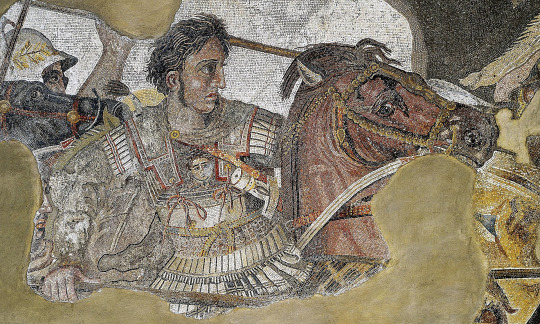
The period from the death of Alexander the Great in 323 until the death of Cleopatra, the last Macedonian ruler of Egypt, is known as the Hellenistic period. In the early part of this period, a new form of kingship developed based on Macedonian and Near Eastern traditions. The first Hellenistic kings were previously Alexander's generals, and took power in the period following his death, though they were not part of existing royal lineages and lacked historic claims to the territories they controlled. The most important of these rulers in the decades after Alexander's death were Antigonus I and his son Demetrius in Macedonia and the rest of Greece, Ptolemy in Egypt, and Seleucus I in Syria and the former Persian empire; smaller Hellenistic kingdoms included the Attalids in Anatolia and the Greco-Bactrian kingdom.
During the Hellenistic period, the importance of "Greece proper" (the territory of modern Greece) within the Greek-speaking world declined sharply. The great capitals of Hellenistic culture were Alexandria in the Ptolemaic Kingdom and Antioch in the Seleucid Empire.
The conquests of Alexander had numerous consequences for the Greek city-states. It greatly widened the horizons of the Greeks and led to a steady emigration of the young and ambitious to the new Greek empires in the east. Many Greeks migrated to Alexandria, Antioch and the many other new Hellenistic cities founded in Alexander's wake, as far away as present-day Afghanistan and Pakistan, where the Greco-Bactrian Kingdom and the Indo-Greek Kingdom survived until the end of the first century BC.
The Antigonid Kingdom became involved in a war with the Roman Republic in the late 3rd century. Although the First Macedonian War was inconclusive, the Romans, in typical fashion, continued to fight Macedon until it was completely absorbed into the Roman Republic (by 149 BC). In the east, the unwieldy Seleucid Empire gradually disintegrated, although a rump survived until 64 BC, whilst the Ptolemaic Kingdom continued in Egypt until 30 BC when it too was conquered by the Romans. The Aetolian league grew wary of Roman involvement in Greece, and sided with the Seleucids in the Roman–Seleucid War; when the Romans were victorious, the league was effectively absorbed into the Republic. Although the Achaean league outlasted both the Aetolian league and Macedon, it was also soon defeated and absorbed by the Romans in 146 BC, bringing Greek independence to an end.
Politics and society
Ancient Greece consisted of several hundred relatively independent city-states (poleis). This was a situation unlike that in most other contemporary societies, which were either tribal or kingdoms ruling over relatively large territories. Undoubtedly, the geography of Greece—divided and sub-divided by hills, mountains, and rivers—contributed to the fragmentary nature of ancient Greece. On the one hand, the ancient Greeks had no doubt that they were "one people"; they had the same religion, same basic culture, and same language. Furthermore, the Greeks were very aware of their tribal origins; Herodotus was able to extensively categorise the city-states by tribe. Yet, although these higher-level relationships existed, they seem to have rarely had a major role in Greek politics. The independence of the poleis was fiercely defended; unification was something rarely contemplated by the ancient Greeks. Even when, during the second Persian invasion of Greece, a group of city-states allied themselves to defend Greece, the vast majority of poleis remained neutral, and after the Persian defeat, the allies quickly returned to infighting.
Inevitably smaller poleis might be dominated by larger neighbors, but conquest or direct rule by another city-state appears to have been quite rare. Instead the poleis grouped themselves into leagues, membership of which was in a constant state of flux. Later in the Classical period, the leagues would become fewer and larger, be dominated by one city (particularly Athens, Sparta and Thebes); and often poleis would be compelled to join under threat of war (or as part of a peace treaty). Even after Philip II of Macedon "conquered" the heartlands of ancient Greece, he did not attempt to annex the territory or unify it into a new province, but compelled most of the poleis to join his own Corinthian League.
Government and law
Initially many Greek city-states seem to have been petty kingdoms; there was often a city official carrying some residual, ceremonial functions of the king (basileus), e.g., the archon basileus in Athens. However, by the Archaic period and the first historical consciousness, most had already become aristocratic oligarchies. It is unclear exactly how this change occurred. For instance, in Athens, the kingship had been reduced to a hereditary, lifelong chief magistracy (archon) by c. 1050 BC; by 753 BC this had become a decennial, elected archonship; and finally by 683 BC an annually elected archonship. Through each stage, more power would have been transferred to the aristocracy as a whole, and away from a single individual.
Athens fell under a tyranny in the second half of the 6th century BC. When this tyranny was ended, the Athenians founded the world's first democracy as a radical solution to prevent the aristocracy regaining power. A citizens' assembly (the Ecclesia), for the discussion of city policy, had existed since the reforms of Draco in 621 BC; all citizens were permitted to attend after the reforms of Solon (early 6th century), but the poorest citizens could not address the assembly or run for office. With the establishment of the democracy, the assembly became the de jure mechanism of government; all citizens had equal privileges in the assembly. However, non-citizens, such as metics (foreigners living in Athens) or slaves, had no political rights at all.
Social structure
Only free, land-owning, native-born men could be citizens entitled to the full protection of the law in a city-state. In most city-states, unlike the situation in Rome, social prominence did not allow special rights. Sometimes families controlled public religious functions, but this ordinarily did not give any extra power in the government. In Athens, the population was divided into four social classes based on wealth. People could change classes if they made more money. In Sparta, all male citizens were called homoioi, meaning "peers". However, Spartan kings, who served as the city-state's dual military and religious leaders, came from two families.
Religion
Religion was a central part of ancient Greek life. Though the Greeks of different cities and tribes worshipped similar gods, religious practices were not uniform and the gods were thought of differently in different places. The Greeks were polytheistic, worshipping many gods, but as early as the sixth century BC a pantheon of twelve Olympians began to develop. Greek religion was influenced by the practices of the Greeks' near eastern neighbours at least as early as the archaic period, and by the Hellenistic period this influence was seen in both directions.
0 notes
Text
welcome!
this blog loves planet earth and the people in it.
some notes:
I generally try to identify places + groups
I try to make conscious decisions about tags that respect cultural identities, consider historical context and reject imperialism. I realize this is impossible and messy and doomed to be inconsistent. choices I've made include one Korea, one Ireland, and multiple tags for separatist states, i.e. Scotland, Catalan Countries.
I am currently unsure when or if it makes sense to tag the "bigger" nation in a post about an autonomous region, ex. China and Tibet, Faroe Islands and Denmark. I want to respect widespread independence movements, but also not become bloated with regional tags. Tibet deserves to be free of China but I have to laugh at modern Texas separatism.
Israel does not get a tag. Jewish diaspora, Free Palestine, genocide, USA, and anti imperialism are used.
I am not always sure when to use the indigenous peoples tag. if I am unsure I will probably leave it out.
except the history and prehistory tag, I currently am not tagging things that no longer exist, ex. Soviet Union, Ancient Greece
Some tags like EU, UK, Africa, Asia, Latin American, Polynesian, etc. are used in posts that refer to many places/groups collectively ex. Lunar New Year in Asia
I try to tag the country/group that an artist/writer/creator belongs to, ex. a post featuring Baldwin tagged with USA, literature, black diaspora
tags are ever-evolving
country/place tags:
Africa, Albania, Armenia, Asia, Australia, Austria, Azerbaijan, Belarus, Belgium, Bhutan, Bosnia and Herzegovina, Botswana, Brazil, Bulgaria, Cameroon, Canada, Catalan Countries, Central African Republic, Chad, Chile, China, Colombia, Congo, Cuba, Czechia, Denmark, Dominican Republic, Emirates, Estonia, Ethiopia, EU, Faroe Islands, Finland, France, Germany, Greece, Greenland, Guatemala, Haiti, Hawai'i, Hungary, Iceland, India, Iran, Ireland, Italy, Japan, Kazakhstan, Kenya, Korea, Kosovo, Kyrgyzstan, Latvia, Lithuania, Malaysia, Maldives, Mexico, Moldova, Mongolia, Montenegro, Mozambique, Namibia, New Zealand, Niger, Nigeria, North Macedonia, Norway, Pakistan, free Palestine, Paraguay, Peru, Philippines, Portugal, Qatar, Romania, Russia, Scotland, Serbia, Slovakia, Slovenia, Somalia, South Africa, South Sudan, Spain, Sri Lanka, Sudan, Sweden, Switzerland, Syria, Taiwan, Tajikistan, Tanzania, Thailand, free Tibet, Turkey, Uganda, Ukraine, USA, Uzbekistan, Vietnam, West Papau, Yemen, Zambia, Zimbabwe
diaspora + ethnic group + cultural group tags:
Ainu, Apache, Bahá'í, Basque, Black diaspora, Chechen, Choctaw, Chulym, Dakota, Dolgan, Galician, Gavião, Guarani-Kaiowá, Hui, Igbo, immigrants, Inuit, Ixil, Jewish diaspora, Karakalpak, Kashmir, Kazakh, Ket, Khakas, Lakota, Latin American, Lezgin, Mah Meri, Maka, Makonda, Mohegan, Ojibwe, Pataxo, Polynesian, Q'eqchi', Rapa Nui, Rohingya, Romani, Rukai, Ryukyuan, Sakapultek, Samburu, Sámi, Selkup, Sioux, Tamil, Tatar, Tigray, Tlingit, Tokalau, Uyghur, Yazidi
culture + other tags:
agriculture, airports, animals and wildlife, architecture, art, children, clothing and textiles, dance, ecology and environmentalism, festivals and holidays, film and tv, food, geopolitics, history, infrastructure, language, literature, maps, music, myth and legend, my posts, nature, prehistory, postcards and stamps, public transportation, religions and belief systems, solidarity, sports and games, traditions and customs, true spirit of the blog, urban landscape, water and boats
ugly tags:
acab, anti capitalism, anti imperialism, anti misogyny, anti xenophobia, genocide
0 notes
Text
Against Timarchus 346-5 (BCE)

Where was I? Oh, I got taken by a stranger into a court case that is entirely different from the event that was happening when Pheidippides died. People were cheering; festivals were happening, rejoicing of family members, raising of wines; it was a celebration. I was caught in the celebration until a tall, slim person in a black trench coat and matrix-type sunglasses took my arm and transported me to the outside of a courthouse. On the courthouse stood a man who was straight in stature and was ruffling through papers, looking like he was preparing for a speech.
I learned after my travels that man was none other than Aeschines, a Greek statesman and orator who supported and advocated for peace with Philip II of Macedonia, who was the political opponent of Demosthenes, who had previously led an attack on Philip II. During the negotiations for peace between Athens and Macedonia, Aeschines tried to bring together the Athenians to embrace the takeover of Macedonia by Greek expansion. Still, after the peace ended, Demosthenes and Timarchus decided to prosecute him for treason. As a way to get back on Demosthenes, Aeschines responded by putting Timarchus on trial for being unfit for the role for personal reasons and gross immorality. He also argues and reinstates his point by going over the laws made for all types of Athenians and compares them to how he believes Timarchus commits these laws badly. In lines 21 and 22, he mentions a law that states, "If any man who has been convicted of prostitution act contrary to these prohibitions, he shall be put to death…" and then follows with reinstating that the law was enacted "concerning youths who recklessly sin against their own bodies" (Aeschines 346).
With this story, Aeschines successfully indicted Timarchus for his actions and was acquitted by nearly half the majority. While this is the most direct approach to appeal to the Athenian jury about Timarchus' "heinous" acts of homosexuality, this story shows how ancient Greek city-states struggled to change class structure and religion. Most of the time, religion was an underlying factor in this case, as well as influence from the government and other factors. However, with this case giving historians evidence that there was homosexuality during the Classical Age, it has shown them various clues about how the Greeks portrayed it as something out of one's nature.
Aside from the thematic elements of the speech, physical and psychological features reinforced how some Greek statesmen and orators got their message across to the people. For example, Plato's views on homosexuality were "highly distinctive" and "not necessarily shared by his fellow Athenians. Aeschines made sure to get his point across by delivering his message directly to the Athenian jury, persuading them to think negatively about Timarchus. The power of oration would later become a tradition in ancient Greece, especially during the Classical Period.
Sources:
Internet History Sourcebooks Project. (n.d.). Retrieved October 30, 2022, from https://sourcebooks.fordham.edu/pwh/aeschines.asp
0 notes
Text
FINAL PROJECT - CIVILIZATION
The Greek inspired ancient civilization of Brairinth
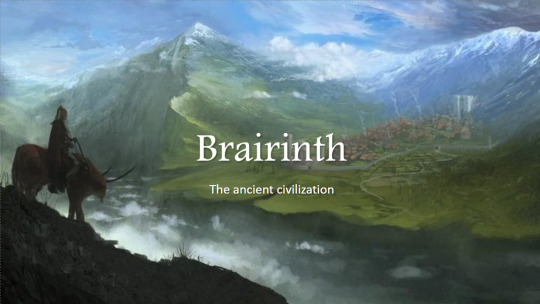
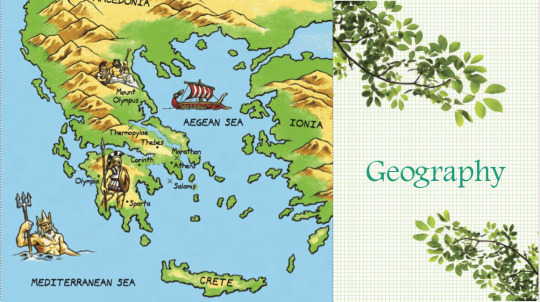
Ancient Greece – northern Greece, mountains surrounding & protecting
Macedonia
Mediterranean sea + Mount Olympus surrounding + route to Aegean sea

Weather is hot, during winter/spring (February-march) there is an extreme rainy season which allows for vegetation to flourish but also it is not completely detrimental as it only lasts like 2 months max. Regular rain other months would occur 2-3 times/month
All 4 seasons don’t really differ in temperature, but they are all there
The sea and rivers provide humidity for vegetation to thrive with natural irrigation

sheep, goats, pigs, chickens, and cows. They were used for meat, milk to make cheese, and fertilizer for crops. Sheep were valuable for their wool, which was used to make clothing.
Brairinth is able to thrive because of its trade and many exports from the mountain which the city-state is located, containing minerals like gold, bentonite, magnesite, perlite, and marble.
Its natural irrigation also allows for exports of rich crops such as apples, figs, pears, pomegranates, cucumbers, lettuce, garlic, and onions.
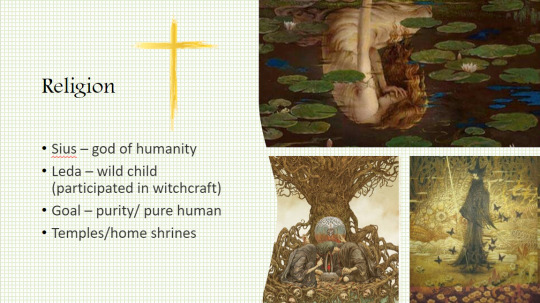
Brairithians have a separate religion from the rest of Ancient Greece, as they worship only one god: Sius.
worships Sius, a deity that upholds the values of viewing all living things as one, therefore treated with respect and understanding on all grounds. Sius was a god sent to earth, who in result created all living things on earth and treated them all as his children.
However, one of Sius’s children, Leda, was selfish and committed acts that refrained her from being human; such as refraining from giving birth and still taking pleasure in sex, and going as far as selling her soul (to Hades, god underworld) in exchange for feeling less emotions and experiencing things that made her superior to other humans such as magic.
For this Sius banished Leda from earth as she was an impure being and was not to live somewhere she could corrupt his other children. He took her to a forest where a tree consumed her and brought her into the underworld. This story carried on with Brairinth and corrupted their sense of justice, which caused them to dictate people’s lives over how pure and human they could be.
Brairithians dictate their day-to-day life with good conduct and pray once a day by leaving their chest and head visible to Sius, letting him see a person’s heart and mind properly. This is so that they may be cleansed of anything “un-human”, un-pure, or magical.
People believe that to successfully be sent to the afterlife unharmed, one must be buried with gifts representing that person’s life so that they do not lose their sense of self after death and their legacy goes with them (eg: craftsman is buried with their creations). Burials should take place immediately to “preserve” the body.
There is a temple high at the top of mount olympus which people must visit atleast once or twice per year to worship Sius genuinely, but many lower class citizens cannot afford to travel to the top of Brairinth to visit the temple so at home shrines are also an option.
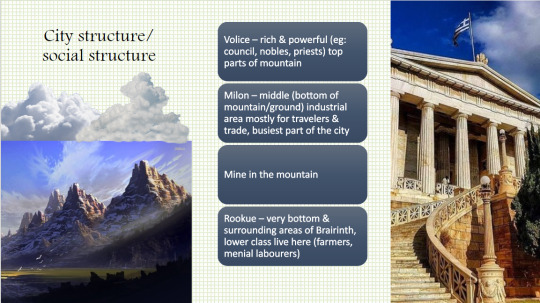
Brairinth is split into 3 sections: Volice, Milon, and Rookue.
Volice lies at the top parts of mount olympus, this is where all the astounding architecture is and where the more powerful and rich people of the city live. (eg: council, nobles, priests). They are involved in leisurely activities like art and buying goods such as carefully articulated clothing, silverware, and jewelry.
Milon is between Volice and Rookue, a middle ground. It is at the bottom of the mountains and outwards to the Aegean sea. This is both a residential area but also a very busy industrial area. Most citizens live here (merchants, craftsmen), but both people from Volice and Rookue travel here to trade and consume merchandise. Shops and businesses are run here, it is an ideal location for travellers who come to do business and trade. More successful shops are located higher up where the air is cleaner and there are better views as well as overall richer surroundings, while less successful shops are located closer to Rookue.
There is also a mine located in upper Milon in the mountains, allowing for mining jobs and exports of minerals like gold, bentonite, magnesite, perlite, and marble.
Rookue is the surrounding areas of the city-state, towards the sea and the natural borders of the mountain start to flatten. This is where the lower class lives (farmers, menial labourers). This area of Brairinth is very vulnerable to floods during the rainy season and would also be the first to be attacked during an invasion. There are not many advantages to living here and a few revolts have been started over the rights of lower class people in this area. This area is ideal for farming however, at least in the northern parts where there is more protection and natural irrigation because of the Mediterranean sea.
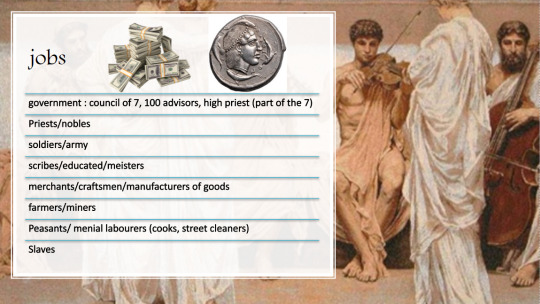
Usually jobs are passed down through class and it's pretty impossible to escape your destined role in society from birth, only people higher up in the hierarchy are able to get educated.

A holiday that takes place in Brairia is the Copiabud, a celebration that takes place every spring on March 20th. It is to celebrate the birth of the very first living creation of Sius, a fir tree. Kind of like Christmas, everyone has a little fir tree in their homes, plants a fir tree, or goes to the heart of the city-state where people gather around a large fir tree and light lanterns like in tangled.
There is also a week of cleansing shortly before the Copiabud to ensure that people are in the right state of mind to pray and celebrate Sius, this week takes place March 1st-7th and includes taking baths infused with oils, singing hymns, wearing sacred clothing, and on the final day not partaking in the consumption of goods/trade/purchasing.
Brairinth of course also takes part in the olympics every 4 years

Buildings and architecture are dependent on which part of the city is being observed.
Overall the same building strategies are used, columns/pillars are common (this is ancient Greece). Rectangular buildings are the most common, while cylinders are also used. Roofs are usually triangular, gable roofs. Higher status homes have 2 floors, sometimes 3. Homes were typically built around a courtyard, allowing space for leisure and to plant a fir tree. Wood and mud bricks were typically used in all homes, while marble was saved for the higher status homes in voice or buildings of importance. Vegetation is highly prioritised, vines and trees and gardens are kept in most homes and throughout cities.

Clothing in brairinth is adapted from other styles in ancient Greece, but the sacred colour is green because of close ties to nature in religion. Many richer people wear jewellery with a tree engraved into it to signify Sius, similar to how christians wear crosses. In fact, trees are symbols present all around Brairinth. It's typically pretty hot all year round so lighter fabric is used. It does get a bit colder in the mountain sometimes as well as windy, so shawls are used for those times.

Brairinth is a democracy built of 7 elected council members who make the laws of the city-state, and 100 government officials who help advise the council members and regulate the laws. The 7 are elected by citizens eligible to vote (old, land-owning dudes).
The 7 are elected based on different categories to ensure that all parts of the city are being listened to:
Meister: in charge of keeping records of history, being well versed in all different types of knowledge and advice well based on past dilemas. Requires very high education and many years in an academy with other scholars. Typically this role is taken by someone older and wiser.
General: in charge of leading the army of Brairinth but also has a place in the council to share matters of the army and fighting, making sure the army has the right materials and training
Architect: in charge of city-planning and advising on building matters and the needs of the citizens architecture-wise (temples, irrigation, public works).
scientist/mathematician/philosopher: knowledge in maths, science, philosophy, and astronomy, just like a meister it requires a lot of years in the academy.
messenger/ traveller/ spy: travels to surrounding areas to gain knowledge to bring back to the council. Kind of like a spy
Agriculture advisor: advises on farming needs and food regulation
Priest: the high priest of the main temple in Brairinth, advises on religious matters/needs
The 100 other government officials also listen and take in the needs of the citizens, citizens may come to the firm on Volice and present their problems for possible solutions (once again unfair to people in Rookue).
Criminals are prosecuted by guards and sent to the firm upon a group of judges and a priest (for Sius’s word on the matter) to decide their fate. Any major offences that are deemed a threat to the entirety of the city-state send the criminals straight to the council of 7 to decide.

Because of the complicated up/down mountain geography, transportation has been made faster with the introduction of pedals and pedaling powered transportation (bikes, really prototype ones). Horses have also become more common for people to ride around.
There is a giant conveyor belt-like system from Milon all the way to Volice made to transport goods (like a mail system), which is powered by pedaling. A new job at Milon requires some strong men to pedal for their lives as they send goods up to Milon. A few have tried to mail themselves to Volice but most failed. Imagine the calves on these guys.

The Hunglepicorina is a common instrument used. It is basically like an ocarina just with a few strings attached to the sides that play similarly to a harp.

Brairinth also introduced an organised prison system, by that I mean they kept criminals in dungeons inside the mountain higher in Volice in order to not intrude with mining. Cages were made to not face one-another so that criminals could not face each other and feel any sort of human connection. Criminals deemed of the highest offences, or threats, were publicly killed. Some criminals were publicly humiliated, made to walk the streets naked and sometimes stuffed in a barrel and rolled down the less steep parts of mount olympus, where everyone was invited to watch. There is not much crime in Brairinth because of fear of the harsh punishments.
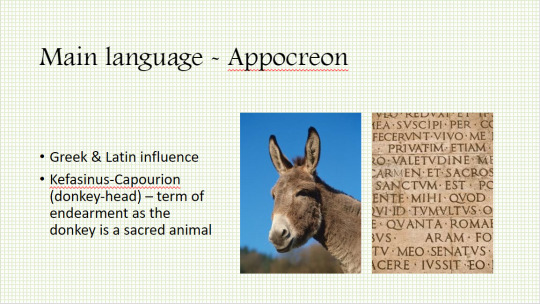
Writing is made through engraving or painting tablets of all sorts of materials. Main language used is Appocreon, similar to Greek and Latin.
A common word used for endearment in this language translates to “donkey-head” (Kefasinus-capourion). In Brairinth calling others donkey heads was a friendly way of saying hello, like “hey bud” or “hi dear friend”, as the donkey is a sacred animal (basically calling somebody wise). However, a war was once almost started over the exchange of this term with a higher up from another city as they mistook the light-hearted phrase for an insult (ass).
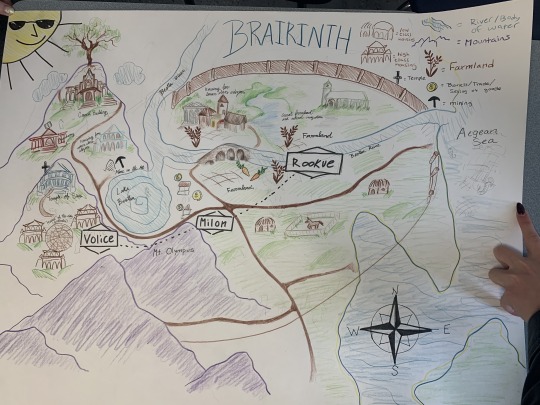

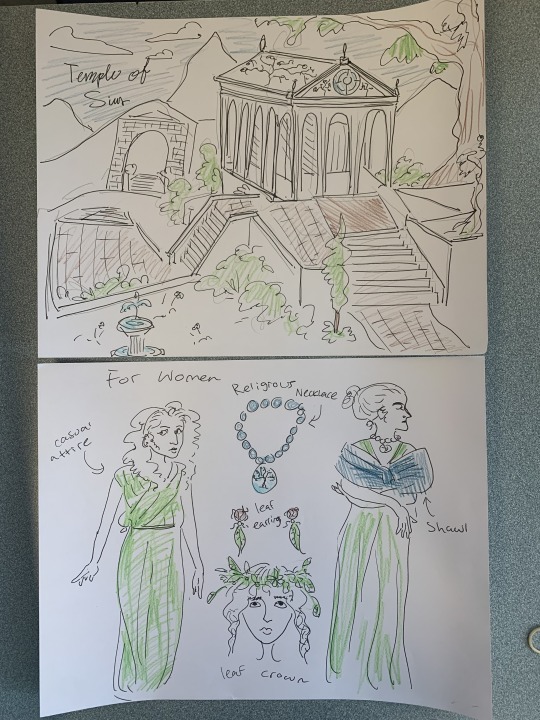
0 notes
Link
By Assil Giacheia
“In an Eden-like environment at the foot of Mount Olympus, featuring lush green vegetation, towering trees, abundant springs and a navigable river, lies Dion, the sacred site of the ancient Macedonians.”
“This area of extraordinary historical importance is located within the modern borders of Pieria, in Central Macedonia.”
Continue reading
#classics#tagamemnon#tagitus#history#ancient history#macedonia#ancient macedonia#mount olympus#dion#sacred site#historic site#archaeology#archaeologists#archaeological site#excavation#archaeological excavations#central macedonia#religion#ancient religion#culture#ancient culture#Olympian Zeus#the Muses#archaeological park#Archaeological Museum of Dion#ancient artefacts#antiquities#antiquity#ancient greece#greek history
24 notes
·
View notes
Photo

Tetradrachm (Coin) Portraying King Demetrius I of Macedonia from Ancient Greece (minted in Amphipolis, Macedonia) (289/288 BCE)
Obverse: Head of King Demetrius I diademed to right
Reverse: Poseidon to left, with foot on rock
6 notes
·
View notes
Photo
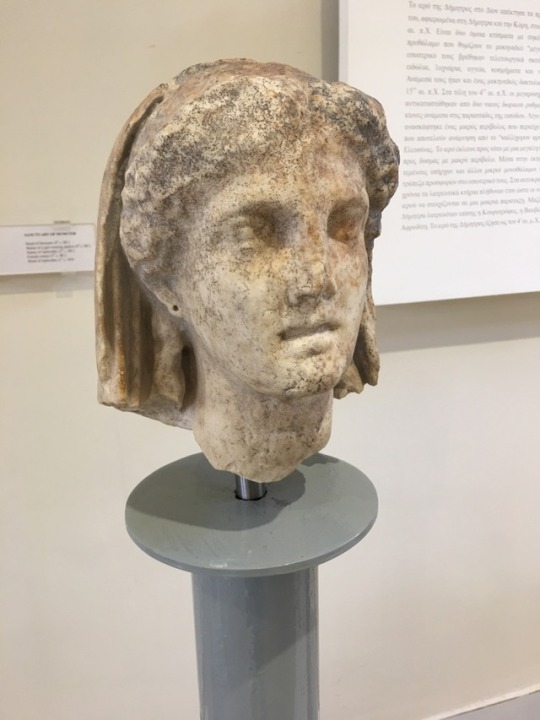
Head of Demeter https://en.wikipedia.org/wiki/Demeter from the 4th century BCE from the sanctuary of Demeter (where Aphrodite https://en.wikipedia.org/wiki/Aphrodite , Kourotrophos https://en.wikipedia.org/wiki/Kourotrophos and Baubo https://en.wikipedia.org/wiki/Baubo were also worshipped) at Dion from the collection of the archaeological museum of Dion https://en.wikipedia.org/wiki/Archaeological_Museum_of_Dion
#Demeter#Aphrodite#mother goddess#ancient greek mythology#ancient greece#greece#hellenistic period#hellenic polytheism#Dion#Macedonia#art#sculpture#Baubo#Kourotrophos#philosophy#cult#religion#history#archaeology#belief
4 notes
·
View notes
Photo

Attis, Phrygian deity of fertility and vegetation and consort of Cybele, plays the panpipes. Macedonian terracotta figurine, artist unknown; ca. 200-150 BCE. Thought to come from Amphipolis; now in the Louvre. Photo credit: © Marie-Lan Nguyen / Wikimedia Commons.
#classics#tagamemnon#Ancient Greece#Macedonia#Hellenistic period#Greek religion#Hellenic polytheism#Attis#art#art history#ancient art#Greek art#Macedonian art#Hellenistic art#figurine#terracotta#sculpture#Louvre#Louvre Museum#Musee du Louvre
174 notes
·
View notes
Text
The Meaning of Names - Calamity Trio
Like any good piece of fiction, the names of the main characters of Amphibia was chosen very, very deliberately. In this case, they are all ordinary sounding western names that actually ties in a lot with the themes and events of the story.
Anne Savisa Boonchuy

Anne has 3 different names, and every one of them have a deeper meaning behind, ranging from her thai background, what her mother always dreamed she would grow up to become, and English Royalty.
Starting with her family name Boonchuy, it roughly translates from Thai "One who encourages or performs good deeds", which is self explanatory.
Anne's greatest attributes is her ability to make connections easily, and inspire those around her, while also being a good person who though she stumbles along the way, is ultimately a good girl who makes the right choices in the end, even if it hurts.
Her middle name though, which I'm rather certain her Mother specifically chose for her(Rather than it being a name she inherited).
Unlike Boonchuy, which is speciffically a Thai name, Savisa is an more general Asian name of Hindu(The forebear religion of Buddhism, which Annes parents seems to be) origin most popular currently in India.
As a name, it has a number of meanings, including Ambition, reliability, professionalism, strength and determination.
In other words, it represents everything that her parents(Or at least Mrs boonchuy) desperately wanted Anne to grow up to become.
It is also the only name amongst the 3 girls that is never used by them. Anne never uses it when referring to herself, which isn't that unusual for an American, but it could also go to show that Anne(Who wasn't exactly living up to her mother's expectations before being transported to Amphibia) has a deep dislike of the name(As doubtlessly she would have been told what it meant) as it represented a standard she never had hope to live up to.
And finally, there is her given name. Anne.
The origin of the name Anne(Like many western names) is Hebrew, meaning Merciful and/or Gracious, in this case referring to Anne's good heart(She generally choses the merciful option when deciding the fate of her enemies, provided you aren't a cannibal, robot, or Sasha after the Throne Room coup), and the way her movement upon her powers fully awakening are supernaturally graceful despite their speed and power.
However, in the modern context, and furthering Anne as the mirror image of Andrias, is of course the fact that Anne is commonly considered a name of royalty, with 3 Queens having had the name.
The most famous of these, is of course Anne Boleyn, the queen consort of England who more than anyone else other than Martin Luther was responsible for incredible success of protestantism across the globe.
However, the Anne that seems to be the one our Anne has a direct connection with, is not her, but Instead Good Queen Anne, the first monarch of Great Britian.

Like Anne Boonchuy, the queen is noted to not have been particularly bright in the academic world, but she was both charismatic and competent at her job, and it was under her that England and Scotland finally united into one political entity, bringing the English Isles archipelago into one, united nation for the first time in history.
In this context, Anne's great role in the story is kinda the opposite, in that her great enemy she must defeat is Andrias, the cruel tyrant Andrias, who was the one who reunited his own archipelago under one banner.
However, the direct connection to Queen Anne is clear enough. And she isn't the only one with a name directly connected to Royalty either.
Sasha Waybright

Sasha's name is a Russian corruption of the ancient Greek name of that most famous of conquerors, Alexander The Great of Macedonia.
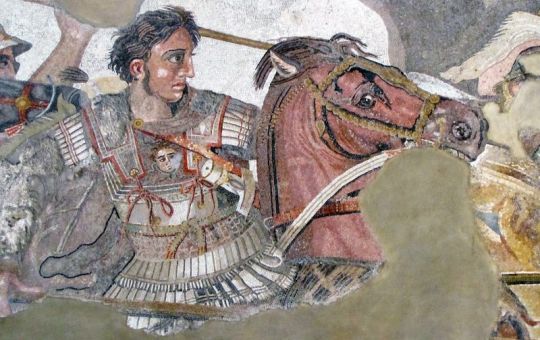
Alexander is of course most famous for having started out as the monarch of a relatively small country, then going on to conquer what at that point in time, was the largest empire the world had ever seen.

An empire that immediatly fell apart after his death as he had no adult heirs to succeed him, and having died young, he had not yet implemented infrastructure that would allow the empire to survive his death.

Just like Alexander, Sasha started out with absolutely nothing, but then alongside her bestie Grime, she went on to conquer her own Empire of enormous size(if it was an earth continent, Amphibia would be somewhere between 4-6th largest nation on earth), and just like Alexander, hers fell apart almost immediatly(less than 2 hours or so).
However, that is not the only connection Sasha has to Alexander through her name.
The name Alexander's actual meaning is "Defender of Man" as in, Mankind.

And at the Gatehouse, Sasha did indeed live up to her name, as her actions of trying to stop Anne(Unintentional or othervise) was indeed trying to protect Mankind against a horrible, evil conqueror who is probably going to be responsible for millions of human deaths before the series is over.
Which is basically Sasha's political plans in a nutshell. Right for all the wrong reasons.
There is also the obvious fact that Sasha will probably live up to her name again in the final part of the series, as she will undoubtedly play a pivotal role in bringing down Andrias, and by doing so, protecting mankind once more, this time with her heart in the right place.
As for her family name, Waybright is probably the most obvious of the girls names. Sasha is at her best when she lights the way for others, when she serves as source of joy and happiness to other people.
The origin of the name however is a bit more complex.
Waybright is an Americanized version of the German Weibrecht, which is a combination of the words Wig which means Battle/War, and Berht which means Bright.
A more accurate translation would be Battlebright, as in, someone who has a talent for war, which very much fits Sasha to a T, being both skilled at fighting, immensely strong thanks to the effects of the box, and while not a genius like Marcy, Sasha is much smarter than average, with a particular cunning.
Marcy Wu
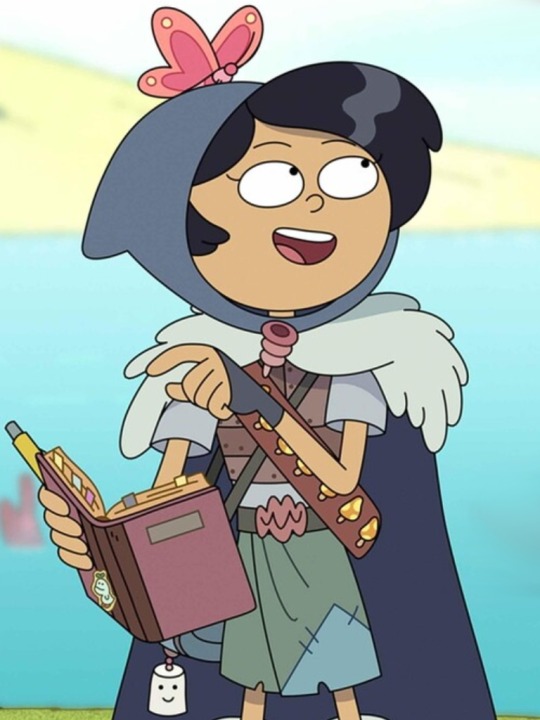
Unlike Anne and Sasha, who's name are directly connected to their personality, actions and inner nature, Marcy's names are specifically meant to be ironic.
Firstly there is her family name Wu.
Wu is a very direct and common chinese name, but it's two possible meanings are as followed.
Firstly, there is "Wu" as translating directly to Military, or Martial.
And Secondly, there is "Wu" as translating to Affairs, or Business.
In regards to business, Marcy rejected her family moving states for economic reasons to such a degree that she literally fled to another world, never planning on ever returning home, in a hard and stark rejection of the cultural values of her ancestors(With familial piety and loyalty pretty much being the cornerstone of the traditional Chinese culture that Taiwan sprang from).
And then of course there is Marcy and martial prowess. Marcy with her abysmal gym performance, who was far and away the physically weakest of the Calamity Trio, and who's physical prowess we see in Amphibia being completely owed to her connection to the green gem, and the subtle power boost it brings.
also, like Anne and Sasha, one of her names has direct connection to Royalty, though in her case, a failed Chinese dynasty and state, rather than a specific person.
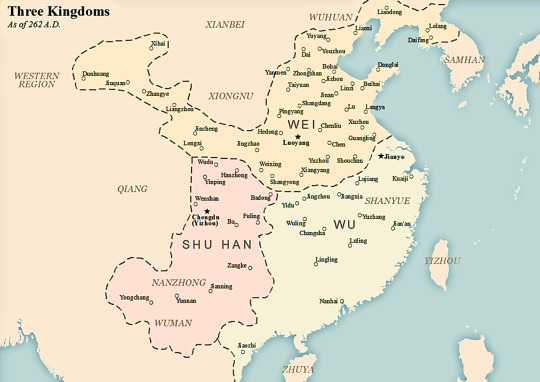
Wu was one of the three states/dynasties that competed for imperial hegemony during the era of the Three Kingdoms, that ultimately lost the battle for supremacy. Which is pretty fitting for Marcy, who was killed Andrias at the end of season 2, and then absorbed/taken over by the Core, just as Wu was annexed by it’s neighboors.
And then there is Marcy, which has a similar meaning as Wu.
Marcy is an an Americanized version of various Latin names all derived from Mars, the Roman God of War. And it literally means to "Warlike", or "Dedicated to Mars".
Needless to say, this is meant to be ironic due to Marcy being a Cinnamon Roll, but there is another layer to this name, and Marcy's connections to it and the way it ties to immigration and colonization.
Marcy is an exclusively American version of this kind of names(Marcus, Marcia, etc), and though now used outside the U.S.A that is where it originated.
More specifically, it originated from the period when american settlers/immigrants to the continent were still pushing west, and as they colonized the continent, they brought the native peoples of the continent to complete and total destruction with such effective brutality that compared to middle and south America, there are practically none of them left compared to how many descendants the colonizers have in modern day.
In regards to how this regards to Marcy, Marcy for all intents and purposes, is an Amphibian immigrant. She left the U.S.A, has found a job, a place in society in her new home, and has no plans of ever going home.
She is a citizen of Amphibia, and she is proud to be such.

However, completely unintentionally on her part, through her bringing back the Calamity Box, not only has she set in motions the development that would go on to destroy huge parts of the land she now calls home, and bring nothing but misery and suffering to it's people, she also allowed the reestablishment of the Amphibian Conlonial Empire, and with it, the complete and total subjugation of the home she left behind.
Marcy is not warlike in the slightest. But her thirst for adventure, and her desperate wish to escape her life on Earth was THE catalyst for bringing back true War, and all that comes with it to Amphibia.
#amphibia#anne boonchuy#sasha waybright#marcy wu#calamity box#calamity trio#names#meta#meta analysis#analysis#hidden meanings
64 notes
·
View notes
Text
Rusaliia
The fourth and last of the pagan practices singled out for censure by the chronicler is Rusalii, described earlier as the folk festival corresponding roughly to Midsummer. The name Rusalii is probably of classical origin and has been traced to the rosalia (rosaría, dies rosae) of the ancient Romans, among whom it signified the days on which ancestors were commemorated with garlands of roses placed upon their graves. The placing of the roses was frequently accompanied by special rites and songs at the gravesite.
The Slavs are believed to have borrowed this commemorative feast from the Romans via Thrace and Macedonia. It eventually spread throughout the Slavonic world, developing its own national and regional peculiarities wherever it appeared. The Kievan Slavs celebrated the festival of Rusaliia as early as the fourth century A.D. According to B. A. Rybakov, it was a week-long celebration that began on 19 June and ended on 24 June, culminating on that date with Kupalo, more commonly known in the West as Midsummer, or the Feast of Saint John the Baptist. With the advent of Christianity, Rusaliia was incorporated into the Kievan liturgical cycle and became identified with the week preceding Trinity Sunday, or Pentecost. It continued to be regarded as a festival of the dead or a festival of ancestors; however, in keeping with the spirit of the new religion, the emphasis shifted from ancestor worship to the shadowy world of those who had the misfortune of dying an unnatural death, particularly women who drowned and infants who died unbaptized. The theme of the festival, as reflected in the numerous songs and rites associated with it, now revolved around the warding off of malevolent rusalki from one's person, home, fields, and village community. (…)
The week-long observance of the Rusaliia traditionally marked the high point of both the agricultural year and the summer festival season. Its strong agrarian overtones are manifested in the belief that the navki or mavki, who have spent the winter in their traditional dwelling place, nearby waters, have now to be escorted into the fields and ultimately into the grain itself to secure a good harvest. Housewives make a path by sprinkling milk on the ground, leading away from the water to the edge of the fields, where the head of the household places a piece of bread for the female water spirits. Once the spirits have passd from the water to the grain, it is safe to bathe in the water without fear of being drowned by the mavki.
Russian Minstrels: A history of the skomorkhi by Russel Zguta
56 notes
·
View notes